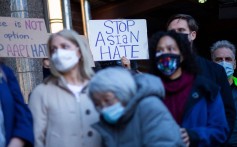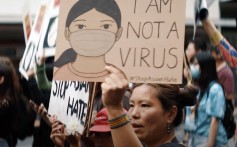Surveillance footage shows a man pulling a merchandise rack to the floor and swinging a street sign post into the glass on the refrigerators
Mark Sung, the son of the store owners, said his family hears insults every day that include statements such as, ‘Go back to your country’
Associated Press
Published: 4 Apr, 2021

A screengrab from a video shows a man with a pole trashing a convenience store in Charlotte. Photo: Mark Sung/Grace Lee Sung via AP
A convenience store in North Carolina, owned by a Korean-American couple, was trashed by a man who wielded a metal post and yelled racial slurs, according to US police and a son of the owners.
Surveillance footage shows a man pulling a merchandise rack to the floor and swinging a street sign post into the glass of the refrigerators. A man who appears to a friend of the attacker cheers him on.
The attack, which occurred at a store called Plaza Sundries in downtown Charlotte on Tuesday, falls in the wake of an attack on an Asian-American woman in
New York City and the fatal shooting of eight people at three Atlanta-area massage businesses. Six of those victims were women of Asian descent.
New York man who kicked Asian-American woman killed his mother in 2002: police
7 Apr 2021

Despite the increase in attention on such attacks, the violence and racially charged language was nothing new, said Mark Sung and his wife and his wife Grace Lee Sung.
“When my husband got the call [about the attack], it was like a routine,” Lee Sung said. “He was like, ‘Okay, check the mess. See the surveillance. File the (police) report’.”
The pandemic has fuelled the tension, the couple said, with some people blaming the
coronavirus on the store’s owners. Sung’s parents have lived in the US for decades since moving from South Korea
“It’s like, ‘Hey, you’re different’,” Lee Sung said, offering a sanitised summary of the insults. “‘You obviously can’t be from around here. Go back to your country’.”

The Charlotte-Mecklenburg Police Department in North Carolina. Photo: CMPD
But the owners have experienced a different sentiment in the days since the attack: A woman arrived at the store and gave the owners soup.
A pizza delivery man showed up with five pies. A local doctor dropped off a cheque. More than US$30,000 has been raised through GoFundMe to cover the store’s damage.
“My in-laws are more shocked that people actually care than they were about the (attack),” Lee Sung said. “And it took them a while to process why they were getting so much attention.”
‘The virus has no nationality’: Asians in France protest against hate crime
Charlotte-Mecklenburg Police said a company that was responsible for security at the transit centre arrested Xavier Rashee Woody-Silas, The Charlotte Observer reported.
He was arrested for robbery with a dangerous weapon, communicating threats, disorderly conduct, injury to personal property and resisting a public officer, according to public records. It was unclear if he had hired a lawyer who could comment on his behalf.
Hate crimes nationally against Asian-Americans and Pacific Islanders have increased 150 per cent during the pandemic, according to a study by the Center for the Study of Hate and Extremism at California State University, San Bernardino.
For Chinese-New Zealanders, rise in anti-Asian hate a reminder of painful past
5 Apr 2021

The outpouring of support for the store’s owners is making them “feel heard”, Lee Sung said of her in-laws.
“My mother in law can’t stop crying every time someone says, ‘I’m so sorry for what you’re going through’,” she said. “It’s just a reminder that – wow, things are not supposed to be this way.”
But the family is being cautious moving forward.
“She’s also scared because she is not used to all this attention,” Sung said of his mother. “So, she is also kind of nervous ... We’re just trying to be careful.”













 Muhammad Abu Jazar, 34, shows his daughter Maisam, 12, a picture of his children who were killed during the 2014 Gaza war
Muhammad Abu Jazar, 34, shows his daughter Maisam, 12, a picture of his children who were killed during the 2014 Gaza war 
